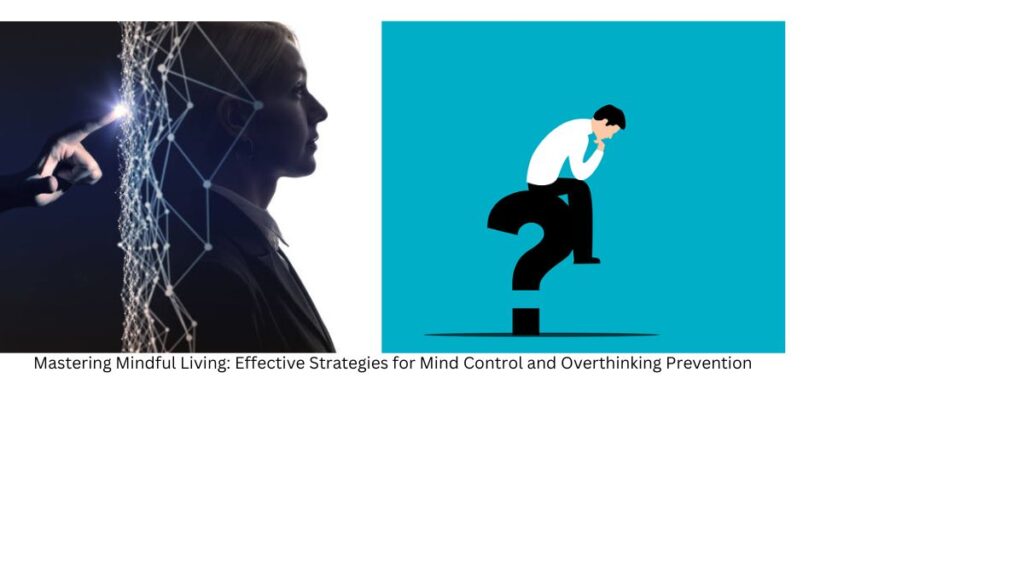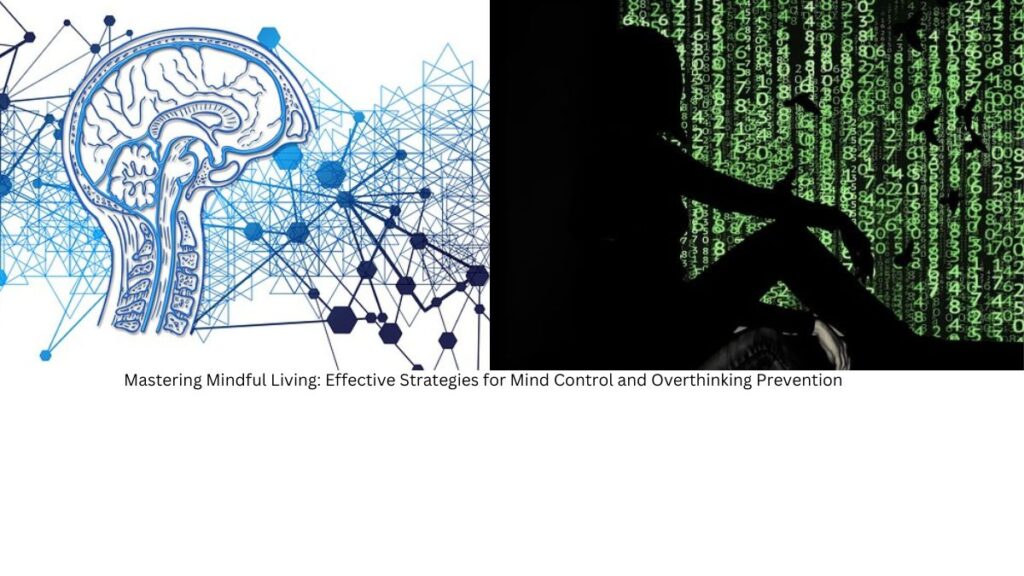Introduction:-
Mastering Mindful Living: Effective Strategies for Mind Control and Overthinking Prevention

In our fast-paced world, the constant stream of thoughts can often lead to overthinking, causing stress and anxiety. However, embracing mindful living can be a powerful antidote. In this article, we’ll explore practical strategies to gain control over your mind and prevent the pitfalls of overthinking.
“How can embracing mindful living serve as a powerful antidote, and what practical strategies does this article explore to help individuals gain control over their minds and prevent the pitfalls of overthinking?”

- Understanding Mindfulness: Explore the concept of mindfulness and how it forms the foundation for a more intentional and present way of living. Learn how to bring awareness to your thoughts and emotions.
- Mindful Breathing Techniques: Dive into specific breathing exercises that promote relaxation and focus. Discover how simple yet profound changes in your breath can positively impact your mental state and help prevent overthinking.
- Cultivating Present Moment Awareness: Uncover the importance of living in the present moment. Explore techniques to anchor your mind in the now, reducing the tendency to dwell on the past or worry about the future.
- Mind Control through Meditation: Delve into the world of meditation and its role in enhancing mental discipline. Learn practical meditation techniques that empower you to gain better control over your thoughts and emotions.
- Setting Healthy Boundaries: Explore the connection between setting boundaries and preventing overthinking. Understand how establishing limits in various aspects of your life can contribute to a more balanced and mindful existence.
- Digital Detox for Mental Clarity: Examine the impact of constant digital connectivity on your mental well-being. Discover the benefits of a digital detox and practical steps to reduce screen time for a clearer mind.
- Gratitude Practices for Positive Thinking: Investigate the role of gratitude in cultivating a positive mindset. Explore gratitude practices that can shift your focus from overthinking to appreciating the positive aspects of your life.
- Mindful Movement: Yoga and Exercise: Understand the connection between physical activity and mental well-being. Discover how mindful movement, such as yoga and exercise, can be powerful tools in preventing overthinking.
- Journaling for Mental Clarity: Embrace the therapeutic benefits of journaling. Learn how putting pen to paper can help you process thoughts, gain insights, and reduce the burden of overthinking.
- Building a Sustainable Mindful Lifestyle: Wrap up with practical tips on integrating mindful living into your daily routine. Explore how consistency and commitment to these strategies can lead to long-term mind control and overthinking prevention.
Does overthinking affect the brain?
Yes, overthinking can have various effects on the brain, as it often involves prolonged and excessive worry or rumination. Here are some ways in which overthinking can impact the brain:
- Increased Stress Levels: Overthinking is often associated with heightened stress levels. Chronic stress can lead to the release of stress hormones, such as cortisol, which, when consistently elevated, may have negative effects on the brain.
- Disruption of Neurotransmitters: Overthinking can disrupt the balance of neurotransmitters in the brain, affecting communication between nerve cells. This imbalance may contribute to mood disorders and anxiety.
- Impact on Memory: Excessive worrying may interfere with memory processes. Individuals who overthink may have difficulty concentrating and recalling information due to the cognitive load imposed by persistent negative thoughts.
- Changes in Brain Structure: Prolonged stress, often associated with overthinking, has been linked to changes in the structure of the brain, particularly in areas related to emotional regulation and memory. These changes may contribute to mental health challenges over time.
- Impaired Decision-Making: Overthinking can impair decision-making abilities. The constant analysis of potential outcomes and the fear of making the wrong choice can create a state of cognitive paralysis, making it challenging to make clear and effective decisions.
- Sleep Disturbances: Overthinking is a common cause of sleep disturbances, such as insomnia. Lack of quality sleep can impact cognitive function, mood, and overall brain health.
- Increased Risk of Mental Health Issues: Persistent overthinking is associated with an increased risk of developing mental health conditions, including anxiety and depression. These conditions can further exacerbate cognitive challenges and negatively affect overall brain function.
It’s important to note that the brain is a highly adaptable organ, and positive changes in thinking patterns and lifestyle can contribute to improved mental well-being. Adopting strategies to manage stress, practicing mindfulness, and seeking support from mental health professionals can help mitigate the negative effects of overthinking on the brain.
How do I stop overthinking and control my mind?
Stopping overthinking and gaining control over your mind involves adopting various strategies and practices. Here are some effective tips:

- Practice Mindfulness Meditation: Engage in mindfulness meditation to bring your focus to the present moment. Regular practice can help you observe your thoughts without getting entangled in them.
- Identify Triggers: Recognize the situations or thoughts that trigger overthinking. Understanding your triggers allows you to address them more effectively.
- Set Realistic Goals: Break down your tasks into smaller, more manageable goals. This prevents your mind from getting overwhelmed and reduces the likelihood of overthinking.
- Establish a Routine: Create a daily routine that includes time for work, relaxation, and self-care. Having a structured routine can provide a sense of stability and control.
- Limit Information Intake: Reduce exposure to information overload. Be selective about the news and content you consume to prevent your mind from being inundated with unnecessary stressors.
- Challenge Negative Thoughts: Actively challenge negative or irrational thoughts. Ask yourself if your concerns are based on facts or assumptions. Reframe negative thoughts into more positive and realistic perspectives.
- Practice Gratitude: Cultivate a habit of gratitude by focusing on the positive aspects of your life. Regularly acknowledging what you are thankful for can shift your mindset away from overthinking.
- Engage in Physical Activity: Exercise has both physical and mental benefits. Regular physical activity can help reduce stress, clear your mind, and improve overall well-being.
- Create a “Worry Time”: Designate a specific time each day for worrying. When anxious thoughts arise, remind yourself that you have a dedicated time to address them, helping prevent constant overthinking.
- Seek Professional Help: If overthinking becomes overwhelming and affects your daily life, consider seeking support from a mental health professional. They can provide guidance and tools to manage your thoughts effectively.
Remember, it’s essential to be patient with yourself as you work on controlling your mind and overcoming overthinking. Implementing these strategies gradually and consistently can contribute to positive changes over time.
Conclusion:
By incorporating these mindful living strategies into your life, you can take proactive steps to gain control over your mind and break free from the cycle of overthinking. Embrace the power of mindfulness for a more centered and fulfilling existence.
https://youtu.be/5j3Ky2jI-rc?si=3Do8GCqYPsBapOBT





